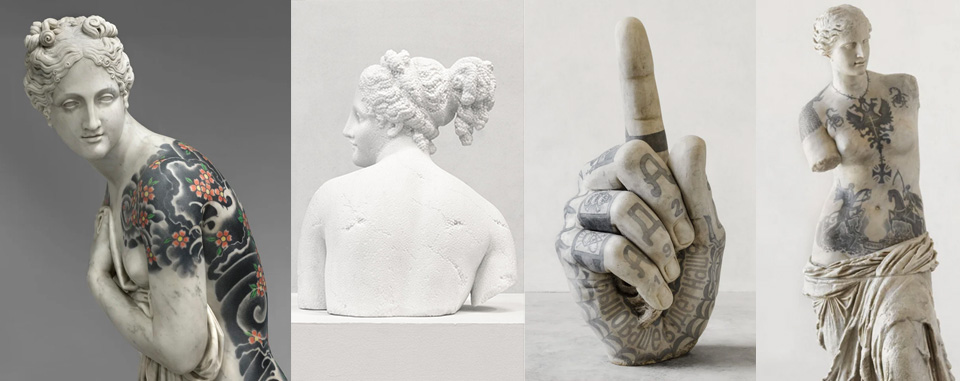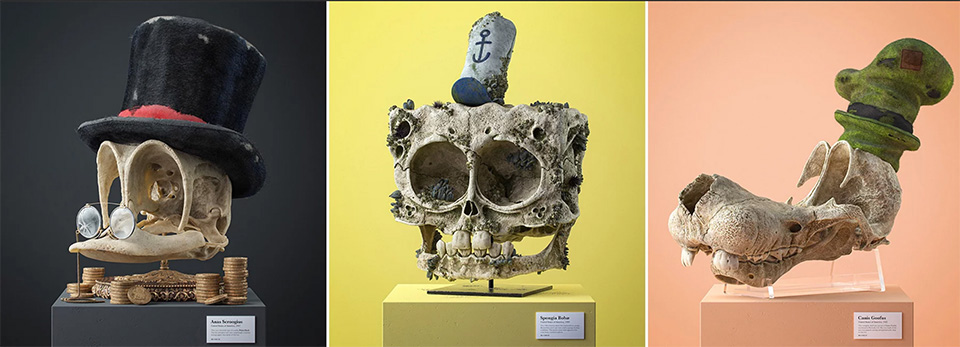Blog
Leaky roofs and broken promises

The leaky roof analogy by the brilliant Seth Godin
In many situations, a leaky roof is worse than no roof at all.
If there’s no roof, we’re not surprised or disappointed if we get hit with some raindrops. But a roof that leaks has raised expectations and then failed to meet them.
Promising us a roof and then breaking that promise might be worse than no roof at all.
Photo by Reza Shayestehpour on Unsplash
Think “Michelangelo” but with tattoos

For your daily inspiration: Italian sculptor Fabio Viale works in marble to make it look like styrofoam. He also recreates famous classic Italian sculptures (think Michelangelo’s David or Pieta) and adds tattoos. His tattooed marble sculptures are not colored on the surface — not painted over — the ink infiltrates the marble in a very similar way that tattoos penetrate human skin.
Pop culture dystopia at its finest

Filip Hodas, illustrator, computer animator, and visual effects artist, has become well known for his pop culture dystopias.cartoon fossils, a digital art series that envisions the preserved remains of our pop icons as if they were fossils.
Check out his work here >>
Read the DesignBoom story here >>
I got 99 problems
 “Money was invented long after humans arrived on the scene, and commerce can’t solve all problems.”
“Money was invented long after humans arrived on the scene, and commerce can’t solve all problems.”
Photo by Eric Muhr on Unsplash
You can’t say you can’t play

There is a lot to learn from this great little post by Seth Godin:
Lenny Levine was a great kindergarten teacher. And he ran his class by this one rule.
It means that if another kid comes along, you need to include them in your game.
That’s it.
It changes everything. It puts an emphasis on connection, not exclusivity. It changes the dynamics of belonging. It weaves together a foundation that crosses traditional boundaries.
It’s a bit like giving every kid in the class a valentine’s day card. Some say that it cheapens the sentiment because it’s not about selection, it’s about inclusion. I think we’ve got plenty of selection already.
Photo by BBC Creative on Unsplash
On seeking a category

Seth Godin on why competition is such a good thing:
A new ice-cream shop opened up downtown. Do you want to go?
Every word in that sentence is easy to understand. We know that a ‘new ice cream shop‘ is a bit like the other ice cream shops in our experience, except a little different and probably better.
And where know where downtown is.
That’s a different question than:
- Have you subscribed to Prodigy? (1989)
- Did you hear that podcast? (2004)
- Want to see my iPhone? (2008)
- Do you know how to program an Arduino? (2016)
When you ask a question about a new entry that’s also in a new category, you’re now trying to do two things:
1. Explain what the thing is. What it rhymes with. What it does. What the parameters are, whether it can be trusted to work, whether or not you’ll feel stupid doing it…
2. Ask whether your friend, now that she vaguely understands what the thing is, even wants it.
I’ve been living in this state of mystery for three decades. I’ve been asked by generous and interested folks, “what’s email?” as well as, “what’s a cd-rom?” and now, “what’s the altMBA?”
First you need to explain the category (which is never glib or easy) and then you can help people figure out whether they want to leap or not.
This is one reason why competition is such a gift. If you have competition, now you have others helping you explain the category. With competition, you can say things like, “We’re like Uber, but without the scandals.”
